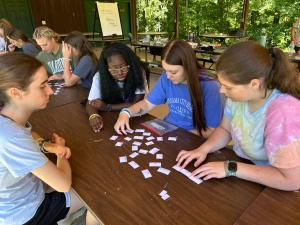WHAT DOES PRAYER REALLY MEAN?
A group of young women were sitting at a local coffee shop. It appeared to be a Bible study group, but only one of the women had a Bible with her. Several had small notebooks. As the meeting began, it didn’t seem to follow the path of a Bible study, but each of the women contributed something. About forty-five minutes later the lady that seemed to be directing the meeting asked the ladies to bow their heads in prayer. One of the women opened her eyes and looked around at the others. She closed her eyes again and then opened them to take a sip of her coffee. The prayer continued, and this time she didn’t close her eyes. She was quiet and respectful of the others praying, but her mind did not appear to be on the prayer.
This makes one wonder how many others do this even in the worship service. How important is it that we bow our heads and close our eyes when we pray? What should our behavior be when we pray on our own or when someone else is praying?
Jesus gave the disciples a pattern for prayer in Matthew 6:5-15. He wanted to help them understand what to do and what not to do. Here are some things they were not to do:
• Do not pray like the hypocrites. Don’t stand in public places and pray so men can see you.
• Pray in private.
• Pray to your Father.
• Do not use empty phrases. Don’t be guilty of praying long prayers and using many words thinking God and men will be impressed.
He then told them how to pray:
• Pray to God, the Father.
• Show honor to the name of God.
• Pray for the kingdom to come. (The kingdom has come which is the church, so we no longer need to pray for it to come. We can pray for it to increase.)
• Pray for God’s will to be done.
• Pray for our daily needs.
• Pray for forgiveness. Notice Jesus says to ask God to forgive us as we forgive others.
• Ask for deliverance from temptation and evil.
This seems like a relatively easy pattern to follow, but we all know that our prayers don’t always sound like this. Unfortunately, our prayers are less about showing honor to God and more about asking for what we want. But praying is not all about us. It is a conversation with God our Father, and it should involve some thought before we enter into it.
I have written in the front of my Bible three principles of prayer. They give some guidance to what we need when we pray.
First, we need faith. What good is it if we pray and don’t believe in that for which we are praying? John says that if we ask anything according to His will, He will hear us. Notice that we must ask “according to His will”, not our own (First John 5:14).
John also says in First John 3:22 that “whatever we ask we receive from him, because we keep his commandments and do what pleases him”. We have to be obedient, and being obedient will guide our prayer requests.
God’s nature is that of a giver. He gives to us that which we need for our good. “Then you will call upon me and come and pray to me, and I will hear you. You will seek me and find me, when you seek me with all your heart” (Jeremiah 29:11-13). We need to seek God’s direction, knowing He will give us what is best for us. We need to remember that God always answers our prayers. Sometimes He says “yes”, sometimes “no”, sometimes “wait”.
Second, we need humility. Jesus clearly shows the need for humility in Luke 18:9-14 in the parable of the Pharisee and the publican. The Pharisee stood and prayed aloud that he was glad that he was not like other men who were extortioners, unjust, adulterers, or even like the tax collector. The Pharisee then pointed out all the things he had done. “I fast twice a week; I give tithes of all that I get”. His prayer is all about him. No reverence, no respect, no humility.
When the publican prayed, he stood away from everyone. He beat his breast and asked God to be merciful to him, a sinner. He said nothing about what he did. He showed humility.
The third principle is thanksgiving. Paul, in his writing to the Ephesians, tells them to address one another in psalms, hymns, and spiritual songs, singing and making melody to the Lord. He also says to give thanks for everything to God in the name of Jesus, submitting to one another out of reverence to Christ. Some of our songs are prayers, and even in our singing we need to be thankful. Paul told Timothy, “I thank him who has given me strength, Christ Jesus our Lord, because he judged me faithful, appointing me to his service” (First Timothy 1:12). Though Paul was a blasphemer, a persecutor of Christians, and an opponent of Christianity, he was able to receive mercy when he became obedient to the gospel. For this, he was thankful. We should have that same thankfulness when we pray. Like Paul, we were and are sinful, but our obedience changes us.
I also have written in my Bible something I like to remember when I pray. It is the letters A C T S. It stands for adoration, confession, thanksgiving, supplication. It helps to remind me that I need to show respect and adoration to God, confess my sins, express my thanks, and only then can I ask of God. Maybe this will help you as well.
Sandra Oliver
 Be Still and Know
Be Still and Know


